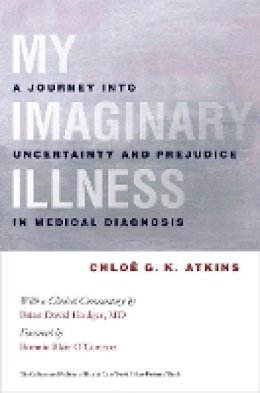
Stock image for illustration purposes only - book cover, edition or condition may vary.
My Imaginary Illness: A Journey into Uncertainty and Prejudice in Medical Diagnosis
Chloe Atkins
FREE Delivery in Ireland
Description for My Imaginary Illness: A Journey into Uncertainty and Prejudice in Medical Diagnosis
Hardback. Series: The Culture and Politics of Health Care Work. Num Pages: 248 pages, black & white illustrations. BIC Classification: VFJB. Category: (G) General (US: Trade). Dimension: 229 x 152 x 23. Weight in Grams: 485.
How Patients Think
At age twenty-one, Chloë Atkins began suffering from a mysterious illness, the symptoms of which rapidly worsened. Paralyzed for months at a time, she frequently required intubation and life support. She eventually became quadriplegic, dependent both on a wheelchair and on health professionals who refused to believe there was anything physically wrong with her. When test after test returned inconclusive results, Atkins's doctors pronounced her symptoms psychosomatic. Atkins was told not only that she was going to die but also that this was her own fault; they concluded she was so emotionally deranged that she was willing ... Read moreher own death.
My Imaginary Illness is the compelling story of Atkins's decades-long battle with a disease deemed imaginary, her frustration with a succession of doctors and diagnoses, her immersion in the world of psychotherapy, and her excruciating physical and emotional journey back to wellness. As both a political theorist and patient, Atkins provides a narrative critique of contemporary medicine and its problematic handling of uncertainty and of symptoms that are not easily diagnosed or known. She convincingly illustrates that medicine's belief in evidence-based practice does not mean that individual doctors are capable of objectivity, nor that the presence of biomedical ethics invokes ethical practices in hospitals and clinics.
A foreword by Bonnie Blair O'Connor, who teaches medical students how to listen to patients, and a clinical commentary by Dr. Brian David Hodges, a professor of psychiatry, enrich the book's narrative with practical guidance for medical practitioners and patients alike.
Show Less
Product Details
Publisher
Cornell University Press United States
Series
The Culture and Politics of Health Care Work
Place of Publication
New York, United States
Shipping Time
Usually ships in 7 to 11 working days
About Chloe Atkins
Chloë G. K. Atkins is Associate Professor at the University of Calgary. Bonnie Blair O’Connor is Assistant Director of Pediatric Residency at Hasbro Children's Hospital/Brown Medical School. Brian David Hodges, MD, is Professor of Psychiatry at the University of Toronto and Director of the Wilson Centre for Research in Education.
Reviews for My Imaginary Illness: A Journey into Uncertainty and Prejudice in Medical Diagnosis
"I met Chloë G. K. Atkins about fifteen years ago. What struck me about her at that time was that she was a leader: smart, courageous, and good humored. This book shows the same Chloë, but along with the context of the battle that she had to lead herself through. The word that comes screaming through every page of ... Read morethis story for me is humility—and how it is so desperately needed by physicians and other health workers who aspire to care for the sick. Every health care worker would be the better for reading Chloë's story."—Peter A. Singer, MD, MPH, FRCPC, FRSC, Professor of Medicine and Sun Life Financial Chair in Bioethics, University of Toronto "In this brave account of her severe experiences of illness, medical neglect, and sometimes outright mistreatment, Chloë G. K. Atkins tells a story that needs to be heard by all clinicians. Doctors and nurses today are expected to treat all of their patients empathetically, whether they like them or not. Yet over and over again we see patients with difficult-to-diagnose conditions, or other predicaments that frustrate clinicians, treated disdainfully. Just as justice is most necessary not when people agree but when they are subject to conflicts, skillful empathy is most necessary when clinicians have complicated, negative emotional reactions to patients. The aim in such cases is for the clinician to empathize with the patient's dilemma, rather than to wait until she can neatly diagnose the patient in order to show empathy. Atkins shows how powerfully therapeutic it was for her when caregivers grasped her dilemmas of daily living, from her own perspective."—Jodi Halpern, MD, PhD, University of California, Berkeley, author of From Detached Concern to Empathy: Humanizing Medical Practice "Chloë G. K. Atkins's gripping book My Imaginary Illness shows scholars and laypersons alike how humiliating and degrading it is for persons with disabilities to routinely face the rampant discrimination that plagues the medical community and society at large. Her compelling narrative reveals how she sought and found her dignity and humanity, all while fighting and recovering from an illness that the medical community could not understand given the limits of biomedical science. In this unique book, Atkins convincingly pokes holes in the biomedical community’s ethical shortcomings and its empirical limitations by employing her own rigorous political theory lens. Doctors, patients, and students of political theory will all profit greatly from reading Atkins's book."—Ruth O'Brien, The Graduate Center, The City University of New York "Chloë G. K. Atkins's book is a must-read for all student and graduate nurses, physicians, medical sociologists, social workers, and all else who work in health care. It dramatically illustrates the dangers of a totalizing medical discourse that denies patients any control over their disease. All health care workers must learn multiple discourses of illness and treatment and respect the embodied experience of patients, eschewing any approach that shames and blames the patient."—Patricia Benner, RN, coauthor of Educating Nurses: A Call for Radical Transformation Show Less

